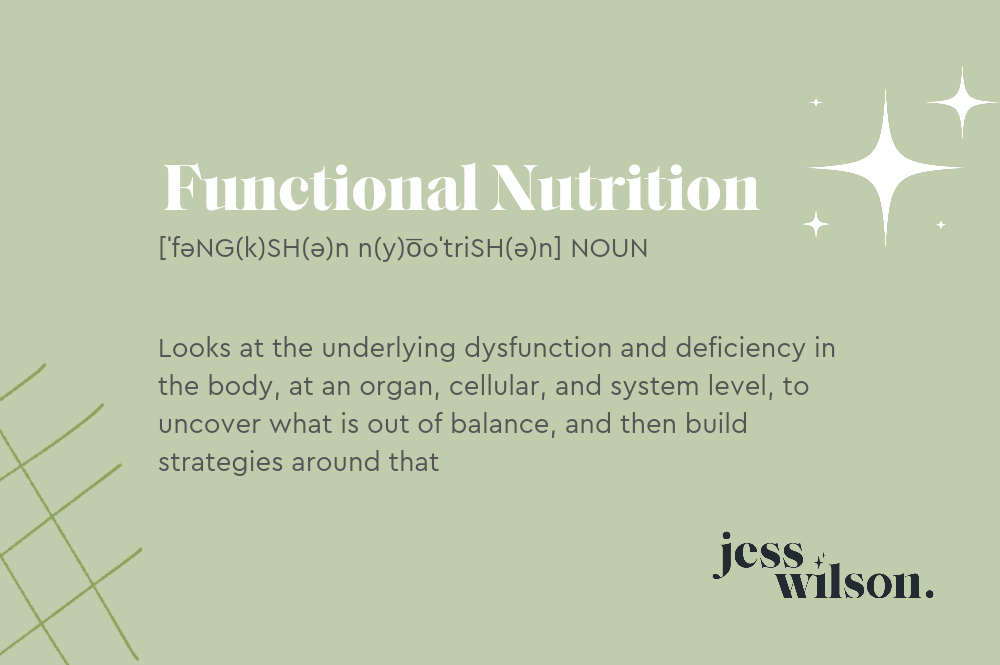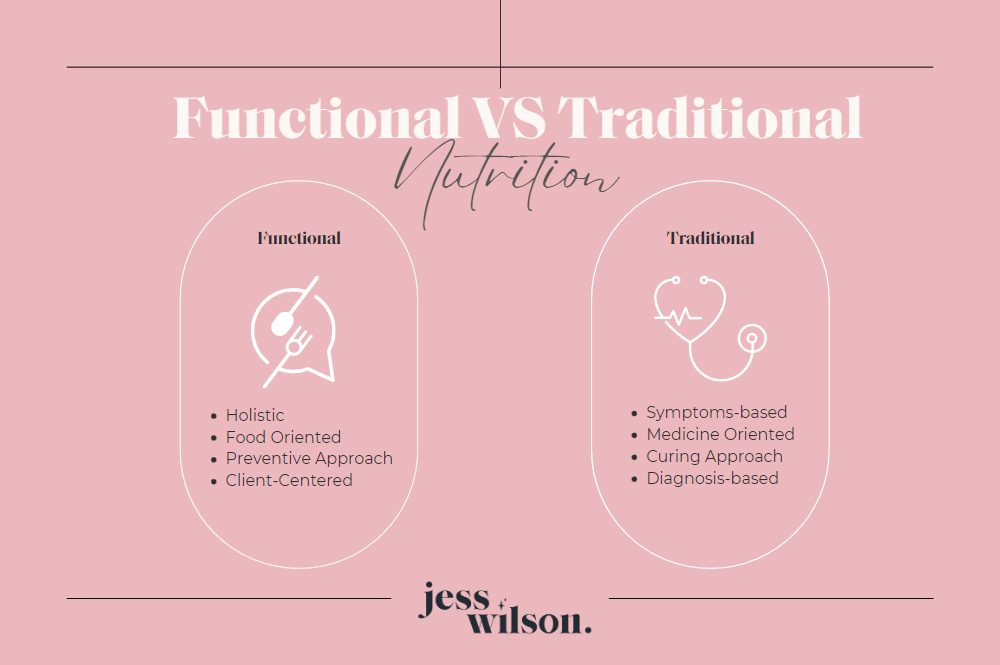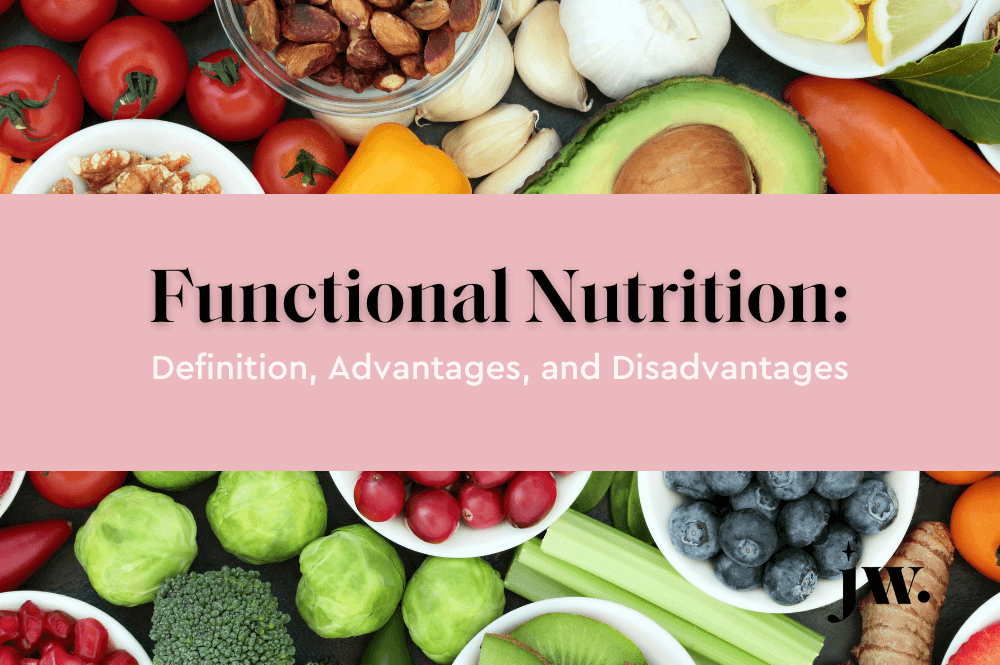I’m sure you have heard of the saying “You are what you eat” a gazillion times! I know.. I know – this may seem cliché to you. But considering that even to this day, it is considered one of the greatest medical recommendations ever given to humanity proves some truth to it.
Think of your diet like a savings account… Good eating choices are an excellent investment! Because food feeds the health of the various cell types, and that makes you who you are! When your cells are properly nourished, the underlying reasons for your problems may be resolved.
As medical science research and technology advance, so does the desire for preventative natural and alternative medicine. This is where Functional Nutrition plays a role.
What is Functional Nutrition?

Functional Nutrition is the discipline of providing nutrition recommendations that take into account every aspect of a person’s health, food, and entire lifestyle. In this sense, it adheres to a systems approach to healthcare, which takes into account how interconnected every element of the body is.
With Functional Nutrition, food IS medicine for a variety of health disorders that you may be struggling to overcome. It basically starts with understanding your symptoms by asking questions and intently listening, intake forms, relevant testing, identifying dysfunctional patterns, and more.
Everyone of us has different nutritional and physiological needs to maximise our vitality. There is no such thing as the best functional nutrition programs. Instead, the best dietary strategy for you is one that is tailored to your specific health concerns.
Nutrition involves so many concepts, beliefs, and theories that it can be tough to keep up with what’s right, wrong, or the latest trend.
Less refined carbs, fewer processed meals, and a greater emphasis on real, whole foods are all core dietary concepts that can benefit us all. But, contrary to what the diet industry would have us believe, there is no such thing as the “best diet” for everyone.
Your bio-individuality influences your nutritional requirements from day to day and throughout your life! Listening to your body’s requirements and desires can allow you to nourish yourself with meals that work for you instead of everyone else on your social media feed.
Difference Between Functional Nutrition And Traditional Nutrition

Personalization is the primary distinction between Functional and Traditional Nutrition. Let’s take a look at some of their other differences.
When it comes to Traditional Nutrition…
- While Traditional Nutrition will provide some benefits, it may also miss opportunities to improve health since it works within a limited framework and a one-size-fits-all approach
- Traditional Nutrition may take a “suppress symptoms” approach and can be rooted in the diet mentality
- Traditional Nutrition focuses on nutritional data, such as the potential of a food or food category to promote or harm health, not necessarily your own body.
- Traditional Nutrition is….well…. The OLD diet pyramid.
- On the other hand, instead of focusing on symptoms or disease, Functional Nutrition focuses on the client.
- It is a tailored, science-based paradigm for maximising health based on individual diets, genetics, lab values, health history, lifestyle, emotional profile, and other factors.
- The emphasis shifts from population-based to customised diet, and from illness care to genuine health care.
- Functional Nutrition views symptoms as indicators of deeper disorders within your body. It emphasises how food is both a fundamental component of health and the source of many physical problems.
- Functional Nutrition considers these facts as well, but in the context of an individual’s physiological constitution and lifestyle, such as how frequently they move, the quality of their relationships, and their stress level.
Simply put, just because a product or food group has been shown to be “good for you” does not mean it is healthy for you – Functional Nutrition means that one size does not fit all!
Advantages of Functional Nutrition
Your body, like your fingerprints, is unique – and so are its nutritional requirements. This is why some people are lactose intolerant, while some people are allergic to eggs or seafood. Even natural, herbal medicine or a detox program that appears to be safe may cause problems if it is not appropriate for your body.
To address underlying health conditions, some people require focused therapies with specific meals. And for the very reason that everyone is unique, nutrient regimens should be tailored to each individual.
- Functional Nutrition regimens are tailored to the particular client.
- Functional Nutrition also allows you to receive the nutrients your body needs. When you provide your body what it requires, you are preparing it to stay healthy.
- Functional Nutrition is also client-centred, which means that the client is an engaged member of the team working on his/her own health goals, rather than having an authoritarian approach.
- While Functional Nutrition recognizes the potency of entire foods, it also recognizes that there is more to health than what you eat.
The saying “Let thy food be thy medicine and thy medicine be thy food,” commonly attributed to the famous Greek physician Hippocrates, is used by Functional nutritionists. They use a Functional approach and emphasise the significance of maintaining a balanced diet and lifestyle in order to address the person’s imbalances.
Disadvantages of Functional Nutrition (there’s not many!)
One disadvantage is the presence of phytochemicals in food which may provide mixed signals about how to plan healthy meals. Furthermore, manufactured functional meals may be less available in nutrients due to the conversion of active substances found in nature during processing. Thus, any association between the use of functional foods and nutraceuticals and health claims should be supported by scientific data.
And while having that kind of face-to-face time is generally beneficial, some people aren’t interested. Maybe you just want to get in and out in fifteen minutes and don’t want to talk to your nutritionist for too long. If this is the case, functional nutrition is probably not for you.
You may also have to make some lifestyle changes. If you’re used to rapid prescriptions and “first aid” fixes, Functional Nutrition may be unfamiliar to you. This will necessitate changes in lifestyle, such as giving up specific meals and creating an exercise routine, which can be difficult at first.
Lastly, Functional Nutrition coaching could be expensive. Nutraceuticals are more difficult to get in supermarkets and grocery stores, and they are frequently pricey. Functional foods with added nutrients can send a mixed message to individuals about how to run their diets. It’s hard to find affordable and quality programs, but it is not impossible!
How It Helps You Improve Your Overall Health
Functional Nutrition supports your body to address the underlying causes of disorders and assists clients in healing through food and nutrition techniques. Because it is largely science-based, but also a client-centred approach, it is utilised in conjunction with normal conventional care.
Many people seek this form of assistance after trying every other avenue without success in their health journey. We want to reverse that, starting with prevention through functional nutrition, so we don’t spend years of lost production.
Functional Nutrition employs food as a natural medicine to help restore balance, replenish vitamin deficits, and repair the gut, among other things.
A healthy lifestyle encompasses more than just what you eat! Basically, I tell people, “my job is to help you rebuild yourself.”
You can never give what you don’t have. Start within yourself. Know and listen to your body. Take care of it. So you can take care of the people and things you need to take care of.
This is how Functional Nutrition can help you.
Besides, it’s not just about eating healthy…It’s about getting your life back, in a body you love and finding your joy again.
After all, isn’t that what life should be about? A meal plan is pointless unless the body is capable of absorbing nutrition in the first place!
Final Thoughts
You are one-of-a-kind. You have your own genetic make-up, medical history, and way of living. Your dietary plan should also be tailored to your specific physique!
Functional nutrition is all about you and your bio-individuality… which is your superpower! When we can understand what’s happening in the body as a whole, and WHY it’s happening, then we can look at clear nutritional strategies to help the body to heal itself… that are based on what YOU actually NEED.
And, as a practitioner who uses functional nutrition to help people achieve their health objectives, I’d love to give you plenty of opportunities to discover what works best for you in order to fulfill your full potential and become your healthiest, happiest self. Work with me and let’s make this possible together!
Related Articles:





